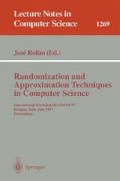Abstract
Three characteristics encountered frequently in real-world machine scheduling are jobs released over time, precedence constraints between jobs, and average performance optimization. The general constrained one-machine scheduling problem to minimize the average weighted completion time not only captures these features, but also is an important building block for more complex problems involving multiple machines.
In this context, the conversion of preemptive to nonpreemptive schedules has been established as a strong and useful tool for the design of approximation algorithms.
The preemptive problem is already NP-hard, but one can generate good preemptive schedules from LP relaxations in time-indexed variables. However, a straightforward combination of these two components does not directly lead to improved approximations. By showing schedules in slow motion, we introduce a new point of view on the generation of preemptive schedules from LP-solutions which also enables us to give a better analysis.
Specifically, this leads to a randomized approximation algorithm for the general constrained one-machine scheduling problem with expected performance guarantee e. This improves upon the best previously known worst-case bound of 3. In the process, we also give randomized algorithms for related problems involving precedences that asymptotically match the best previously known performance guarantees.
In addition, by exploiting a different technique, we give a simple 3/2-approximation algorithm for unrelated parallel machine scheduling to minimize the average weighted completion time. It relies on random machine assignments where these random assignments are again guided by an optimum solution to an LP relaxation. For the special case of identical parallel machines, this algorithm is as simple as the one of Kawaguchi and Kyan [KK86], but allows for a remarkably simpler analysis. Interestingly, its derandomized version actually is the algorithm of Kawaguchi and Kyan.
Preview
Unable to display preview. Download preview PDF.
References
C. Chekuri, R. Motwani, B. Natarajan, and C. Stein. Approximation techniques for average completion time scheduling. In Proceedings of the 8th ACM—SIAM Symposium on Discrete Algorithms, pages 609–618, 1997.
M. E. Dyer and L. A. Wolsey. Formulating the single machine sequencing problem with release dates as a mixed integer program. Discrete Applied Mathematics, 26:255–270, 1990.
R. L. Graham, E. L. Lawler, J. K. Lenstra, and A. H. G. Rinnooy Kan. Optimization and approximation in deterministic sequencing and scheduling: A survey. Annals of Discrete Mathematics, 5:287–326, 1979.
M. X. Goemans, June 1996. Personal communication.
M. X. Goemans. Improved approximation algorithms for scheduling with release dates. In Proceedings of the 8th ACM—SIAM Symposium on Discrete Algorithms, pages 591–598, 1997.
L. A. Hall, A. S. Schulz, D. B. Shmoys, and J. Wein. Scheduling to minimize average completion time: Off—line and on—line approximation algorithms. Preprint 516/1996, Department of Mathematics, Technical University of Berlin, Berlin, Germany, 1996. To appear in Mathematics of Operations Research.
L. A. Hall, D. B. Shmoys, and J. Wein. Scheduling to minimize average completion time: Off—line and on—line algorithms. In Proceedings of the 7th ACM—SIAM Symposium on Discrete Algorithms, pages 142–151, 1996.
T. Kawaguchi and S. Kyan. Worst case bound of an LRF schedule for the mean weighted flow—time problem. SIAM Journal on Computing, 15:1119–1129, 1986.
E. L. Lawler. Sequencing jobs to minimize total weighted completion time subject to precedence constraints. Annals of Discrete Mathematics, 2:75–90, 1978.
C. Phillips, C. Stein, and J. Wein. Scheduling jobs that arrive over time. In Proceedings of the Fourth Workshop on Algorithms and Data Structures, number 955 in Lecture Notes in Computer Science, pages 86–97. Springer, Berlin, 1995.
A. S. Schulz. Scheduling to minimize total weighted completion time: Performance guarantees of LP—based heuristics and lower bounds. In W. H. Cunningham, S. T. McCormick, and M. Queyranne, editors, Integer Programming and Combinatorial Optimization, number 1084 in Lecture Notes in Computer Science, pages 301–315. Springer, Berlin, 1996. Proceedings of the 5th International IPCO Conference.
W. E. Smith. Various optimizers for single—stage production. Naval Research and Logistics Quarterly, 3:59–66, 1956.
A. S. Schulz and M. Skutella. Scheduling—LPs bear probabilities: Randomized approximations formin—sum criteria. Preprint 533/1996, Department of Mathematics, Technical University of Berlin, Berlin, Germany, November 1996; revised March 1997. To appear in Springer Lecture Notes in Computer Science, Proceedings of the 5th Annual European Symposium on Algorithms (ESA'97).
Author information
Authors and Affiliations
Editor information
Rights and permissions
Copyright information
© 1997 Springer-Verlag Berlin Heidelberg
About this paper
Cite this paper
Schulz, A.S., Skutella, M. (1997). Random-based scheduling new approximations and LP lower bounds. In: Rolim, J. (eds) Randomization and Approximation Techniques in Computer Science. RANDOM 1997. Lecture Notes in Computer Science, vol 1269. Springer, Berlin, Heidelberg. https://doi.org/10.1007/3-540-63248-4_11
Download citation
DOI: https://doi.org/10.1007/3-540-63248-4_11
Published:
Publisher Name: Springer, Berlin, Heidelberg
Print ISBN: 978-3-540-63248-1
Online ISBN: 978-3-540-69247-8
eBook Packages: Springer Book Archive

